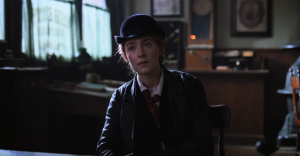By: Tay Yek Keak
The super-outcast movie, Joker, may have defined the age of Trump in stark and scary terms. But who would have thought that a terrific, suitably updated film about four sisters in the 19th century would be so good at defying it?
Consider this. Joker is anarchic in its nod to a chaotic and divided era in America right now. But director-writer Greta Gerwig’s fresh take on Little Women – adapted from the seminal, groundbreaking 1868 novel by Louisa May Alcott – is conversely cathartic and very effective in posing a reaction against this turmoil by advancing progressive, fittingly modern ideals.
The March family from Massachusetts – comprising decent dad, kind mom and four opinionated daughters – although not well-to-do, are nevertheless well-mannered, early-liberal givers. Notwithstanding the constant need here to marry into wealth to live a comfortable life, they are not crude or coarse grabbers of anything crude or coarse or billionaire-crass inelegant.
The father is mostly absent from the family home as he goes off to fight for the Union cause in the American Civil War of the 1860s. That’s the northern blue side of combatants which probably wouldn’t be hooting for Donald Trump in packed rallies down the conservative south if it was still around.
The overcaring mother, Marmee March, played by Laura Dern with a face anxious about the soul of mankind, encourages her four girls to give up their Christmas breakfast to a poor family living nearby. The girls, with stomachs growling, aren’t initially keen to do this. But they understand, empathise, relent and lug their baskets of food across the freezing snow to donate generously after their mom appeals to their better angels.
We seem to read a lot about this concern from half of America these days. This idea of reaching out to better angels to be kinder to the unfortunate, homeless and, as the inscription on the Statue Of Liberty says, huddled masses. Aka the sort of folks living in those “rat and rodent-infested” dumps which someone in charge has railed callously against before.

Alcott’s Little Women, as befitting the pious tenor of her time, primarily gave out of religious motivation. In Gerwig’s version, the cause to donate is borne more out of universal charity than parochial piety. Godly overtones have been downplayed in another telling contrast.
And in even more un-Trumpian terms, there’s a scene in the movie which shows Mama March at her big-tent fiercest. Her most headstrong and progressive daughter, Jo (the mesmerising Saoirse Ronan), is a smart and prodigious writer who is determined not to compromise and marry her way out of financial dire straits.
She has a suitor with an accent however, Friedrich Bhaer (played by French actor Louis Garrel), a German professor evidently not born in the USA. He reveals rather embarrassingly his plan to head west to pioneering California where people might treat an immigrant like him better. Marmee looks him directly in the eye and speaks firmly to set his doubts about her America straight – “You are not an immigrant”. Mention the “big beautiful wall” of Trump to this affronted lady and you’re likely to get thumped on the head.
Now, all this liberal pushback in Little Women is due in no small part to the primary role of big, strong women in the movie, both in its inception and execution. Put simply, from helmer Gerwig to the superb cast – Ronan, Dern, Emma Watson, Florence Pugh – is assembled here a bevvy of female-empowerment advocates so exciting to see, enjoy and cheer for that you can quite confidently predict that this flick probably isn’t going to be a standing-room-only main event at the White House screening room.
To understand the power of this potent feminist force, look no further than the pitch-perfect dynamic duo of Gerwig and Ronan. The astute director dares to propagate her vision of unconventional gender culture and untamable independent thought. The astounding actress, in her role as avatar, muse and alter-ego, dares to transmit that ambition and message utterly and fearlessly to Oscar-nominated levels. In their films together – the splendid Lady Bird (2017) was the first – they take no prisoners in asserting that independence.

Into Little Women is inserted a significant male interloper into the cabal of sisters. Timothee Chalamet plays Theodore “Laurie” Laurence, a rich, charming Mephistopheles of sorts who toys with the girls who are unsure about the limits of their emotions, status and abilities. He hurts them while loving them at the same time.
“He’s a real boy. We don’t want any boys. This is a club for girls,” goes the sisters’ defiant stance. Eventually, though, in Gerwig’s timely story here, he too will come to exist in their world as they unite to “Make America Greta Again”.
Tay Yek Keak is a movie buff who enjoys watching films, talking about films and occasionally writing about films. But astonishingly, he still can’t think and chew gum at the same time.

